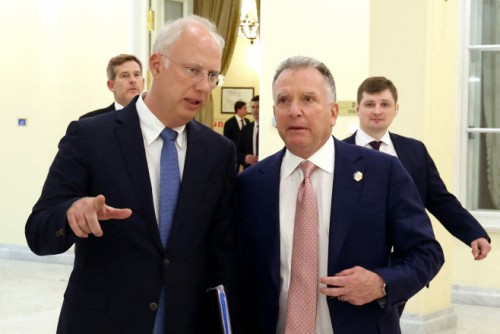 |
| Kirill Dmitriev, CEO of the Russian Direct Investment Fund and special envoy for overseas investment and economic cooperation, speaks with Steve Witkoff, U.S. presidential envoy, in St. Petersburg on April 11. / Reuters·Yonhap |
A phone call between U.S. presidential envoy Steve Witkoff and Yuri Ushakov, foreign policy adviser to the Kremlin, has been made public, revealing that Witkoff offered guidance favorable to Russia in ongoing discussions over a Ukraine cease-fire proposal. The disclosure has triggered a widening political storm.
According to a Bloomberg report on Nov. 25, Witkoff advised Ushakov during their Oct. 14 conversation that President Vladimir Putin should initiate his call with U.S. President Donald Trump by congratulating him on brokering a cease-fire agreement in Gaza, using this as a way to open the dialogue. This advice reportedly influenced the background to the eventual Putin–Trump call.
The AP published additional images showing Putin meeting his envoy Kirill Dmitriev, with Witkoff present, underscoring the growing scrutiny of the envoy’s Russia contacts.
In the roughly five-minute call with Ushakov, Witkoff went further, suggesting that Russia might solidify its control over Donetsk in the Donbas region and even raising the possibility of territorial “exchanges.”
The call took place as Trump was becoming increasingly critical of Putin for, in his view, prolonging the war just after Trump helped mediate the Gaza cease-fire and signed the “Gaza Peace Declaration” during a visit to Egypt.
Witkoff also informed Ushakov that Ukrainian President Volodymyr Zelenskyy would soon visit the White House, effectively advising on timing. Indeed, the Putin–Trump call occurred on Oct. 16, the day before Zelenskyy arrived, and unfolded precisely along the lines Witkoff suggested: Putin opened by congratulating Trump on the Gaza agreement, and the call ended in a diplomatic win for Moscow.
The next day, Trump rejected Zelenskyy’s request for long-range Tomahawk missiles and began stepping up pressure on Kyiv.
Axios later reported on Nov. 18 that Witkoff and Jared Kushner met with Dmitriev in Miami from Oct. 24 to 26, where they drafted a 28-point peace plan that included transferring parts of the Donbas to Russia. Reuters also reported on Nov. 26 that the U.S. proposal incorporated elements of a document Moscow had given Washington in October, sharing Russia’s cease-fire terms with senior U.S. officials after the Oct. 16 meeting between Trump and Zelenskyy.
U.S. Secretary of State Marco Rubio and Andriy Yermak, Zelenskyy’s chief of staff, met in Geneva on Nov. 23 and agreed on a revised 19-point peace plan that reflected far more of Kyiv’s demands.
Meanwhile, Russia has denounced the leak of the call as an effort to undermine U.S.–Russia dialogue and sabotage peace efforts. In an interview with Kommersant, Ushakov called the release “unacceptable,” saying the leak was clearly intended to disrupt ongoing discussions. He noted that parts of the conversation were conducted over encrypted government channels, making unauthorized interception highly unlikely unless one of the parties intended it.
Kommersant titled its interview “Who Trapped Steve Witkoff?”, suggesting a belief in Moscow that the leak was engineered to oust Witkoff and block a peace plan favorable to Russia. Deputy Foreign Minister Sergei Ryabkov echoed this, claiming European actors were using the controversy as part of a “hybrid war” aimed at damaging Russia–U.S. relations.
Most Read
-
1
-
2
-
3
-
4
-
5
-
6
-
7





















